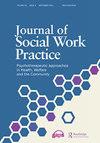“差异产生差异”(Bateson, 1972):神经多样性范式和系统方法如何支持个人和组织促进关于自闭症的更有益的对话
IF 1.4
4区 社会学
Q3 SOCIAL WORK
引用次数: 0
摘要
摘要本文探讨了系统方法支持神经多样性观点的可能性,以及这些镜片如何提高社会工作者支持自闭症患者的能力。这些想法植根于我作为一名自闭症从业者研究员在英国地方政府法定儿童服务部门开展的一个行动研究项目。社会工作者在工作中很可能会遇到自闭症。自闭症被广泛误解,经常被歪曲,并带有持续的社会污名,但神经多样性为欣赏和理解自闭症作为一个人多样性的一部分提供了一种新的范式,带来了优势和挑战(Haney,第63-64页)。社会工作者被授权倡导受压迫群体的权利,并促进各种形式的多样性。因此,反思目前主导实践的关于自闭症的假定知识和挑战缺陷驱动的主导话语,应该是所有良好社会工作实践的一部分。我的项目发现以及随后的思考呼吁英国社会工作者、地方当局和社会工作教育计划接受神经多样性,这可以通过系统的方法和技术来帮助。本文章由计算机程序翻译,如有差异,请以英文原文为准。
“Difference which makes a difference” (Bateson, 1972): how the neurodiversity paradigm and systemic approaches can support individuals and organisations to facilitate more helpful conversations about autism
ABSTRACT This article explores the possibilities for systemic approaches in supporting a neurodiversity perspective, and how these lenses may improve social workers’ abilities to support autistic people. These ideas are rooted in an Action Research project I undertook, as an autistic practitioner-researcher, in a statutory children’s services department of a UK Local Authority. Social workers are very likely to encounter autism in their work. Autism is widely misunderstood, often misrepresented, and carries a persisting social stigma, but neurodiversity offers a new paradigm for appreciating and understanding autism as part of a person’s diversity, bringing strengths and challenges (Haney, pp. 63–64). Social workers are mandated to advocate for the rights of oppressed groups and promote diversity in all its forms. Therefore, reflecting on presumed knowledge and challenging deficit-driven dominant discourses about autism that currently govern practice should be part of all good social work practice. The findings of my project, and subsequent reflections call for UK social workers, local authorities and social work education programmes to embrace neurodiversity, which can be aided by systemic approaches and techniques.
求助全文
通过发布文献求助,成功后即可免费获取论文全文。
去求助
来源期刊

Journal of Social Work Practice
SOCIAL WORK-
CiteScore
2.50
自引率
7.10%
发文量
39
期刊介绍:
The Journal of Social Work Practice publishes high quality refereed articles devoted to the exploration and analysis of practice in social welfare and allied health professions from psychodynamic and systemic perspectives. This includes counselling, social care planning, education and training, research, institutional life, management and organisation or policy-making. Articles are also welcome that critically examine the psychodynamic tradition in the light of other theoretical orientations or explanatory systems. The Journal of Social Work Practice is committed to a policy of equal opportunities and actively strives to foster all forms of intercultural dialogue and debate.
 求助内容:
求助内容: 应助结果提醒方式:
应助结果提醒方式:


